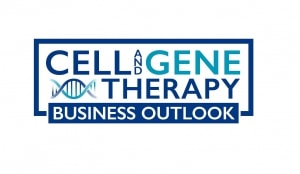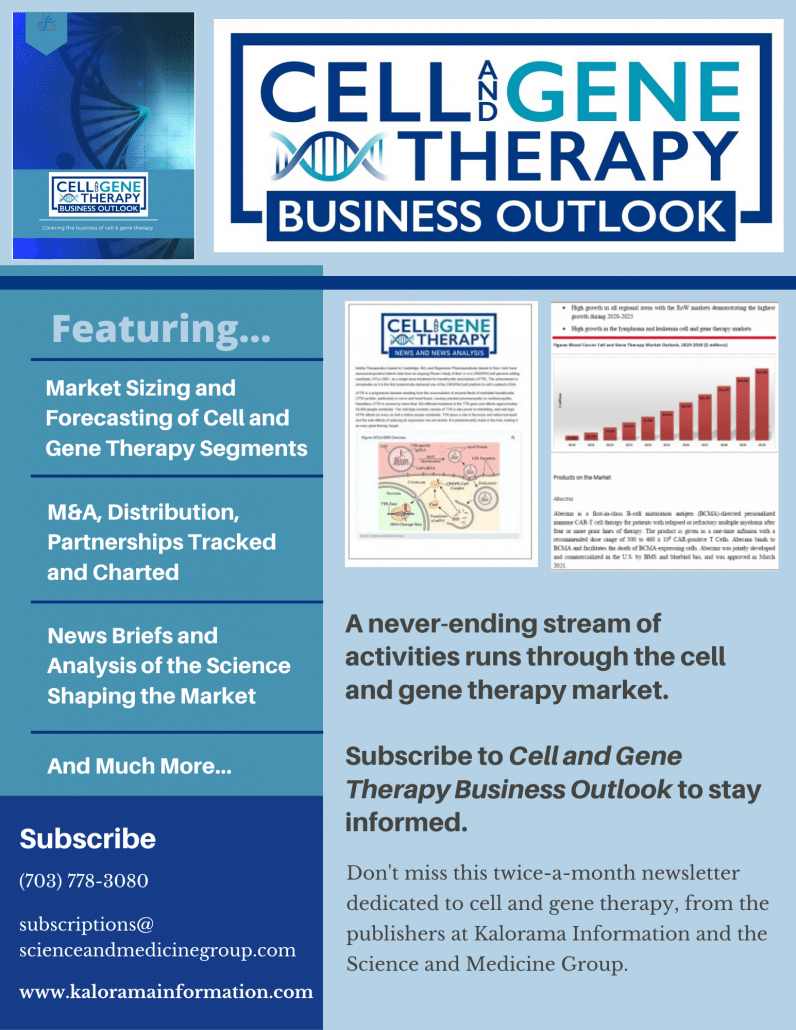
There have been a number of recent developments in cell and gene therapy, as detailed in our bimonthly newsletter, Cell and Gene Therapy Business Outlook.
- Editforce, based in Fukuoka, Japan, has entered a license agreement with Mitsubishi Tanabe Pharma Corporation (MTPC), based in Osaka, Japan, to develop potential gene therapy candidates to treat an undisclosed disease of the central nervous system (CNS) using Editforce’s proprietary pentatricopeptide repeat (PPR) protein platform. PPR proteins are commonly found in plants, and are characterized by a 35-nucleic acid sequence motif (the PPR) typically found in tandem repeats. They seem to play a role in the regulation of gene expression by sequence-specific binding to DNA and RNA. Editforce’s PPR protein platform is based on the work of Takahiro Nakamura and Yusuke Yagi, PhD (EditForce’s CTO), who have discovered the mechanism by which PPR proteins determine sequence specificity and developed the technology to create custom PPR proteins to bind to specific target DNA or RNA sequences. These engineered PPR proteins can then be fused to effector proteins to modify a target genome or RNA, either inside or outside the cell. Under the agreement, MTPC will select the drug candidate molecules and handle the preclinical and clinical development, manufacturing, and commercialization worldwide. In exchange, EditForce will receive an upfront payment and milestone payments of over ¥20 billion ($150 million), depending on development progress, plus potential royalties on commercial sales.
- Astellas Pharma, a regenerative medicine company based in Tokyo, Japan, and Mogrify, a cellular reprogramming company based in Cambridge, UK, have announced a collaborative research agreement to develop in vivo regenerative medicine therapies for the treatment of sensorineural hearing loss. Mogrify will use its proprietary direct cellular reprogramming platform to identify which combinations of transcription factors are required to differentiate new cochlear hair cells, while Astellas Gene Therapies, a division of Astellas, will fund the research and contribute its expertise in adeno-associated virus (AAV) based gene therapies and translational capabilities to conduct pre-clinical research. Mogrify will also characterize, screen, and validate potential therapeutic factors with its bioinformatic platform.
- Inceptor Bio, based in Morrisville, NC, has announced a collaboration with University of Minnesota to develop an induced pluripotent stem cell (iPSC) platform for its cell therapy programs. Inceptor Bio is developing a broad portfolio of chimeric antigen receptor (CAR) cell therapies, including CAR-T, CAR-M (macrophage), and CAR-NK (natural killer) cell therapies. The company plans to incorporate the iPSC platform into its proprietary K62 platform for CAR-M therapy (which enhances the phagocytic properties of macrophages and supports a M1 anti-tumor phenotype), as well as its novel M83 co-stimulatory domain for CAR-NK therapies. Inceptor Bio will retain an exclusive license to technology developed through the partnership.
- ARCH Venture Partners, based in Chicago, IL and announced the closing of ARCH Venture Fund XII, a $2.975 billion fund for the creation, development, and funding of early-stage biotech companies. The fund is ARCH’s largest to date, breaking the previous $1.941 billion record set by ARCH Venture Fund XI in January 2021. ARCH says that Fund XII will be used to invest in early-stage biotech companies formed around breakthrough technologies in a wide range of areas including “infectious disease, mental health, immunology, oncology, neurology, age-related diseases, manufacturing, clinical trials, genomic and biological tools, data sciences, and ways to reimagine diagnostics and therapies.” ARCH’s managing directors include Robert Nelsen, Keith Crandell, Kristina Burow, Mark McDonnell, Steve Gillis, and Paul Berns.
- FUJIFILM Corporation, based in Tokyo, Japan, has announced that it will invest $6 billion into FUJIFILM Diosynth Biotechnologies, its contract development and manufacturing organization (CDMO) subsidiary. This investment will enhance and expand culture manufacturing services at the company’s sites in Hillerød, Denmark, and Texas in the United States. Eight 20,000L bioreactors and two downstream processing streams will be added to the Denmark facility, creating approximately 450 jobs and making it the largest end-to-end CDMO in Europe with a total of twenty 20,000L bioreactors. The Denmark facility will also be enhanced with green energy sustainability measures designed to achieve net zero CO2 emissions by the end of 2040. At the Texas site, the company will install its proprietary SymphonX production equipment, a fully automated, customizable end-to-end downstream purification platform to enable its cGMP MaruX continuous processing technology. FUJIFILM has been actively investing in expansion of its manufacturing capabilities in recent months. At the end of 2021, FUJIFILM Diosynth invested £400 million ($533 million) to expand operations at its U.K. facility in Billingham, and acquired a 90,000-square-foot cell therapy manufacturing facility in Thousand Oaks from Atara Biotherapeutics for $100 million at the beginning 2022. FUJIFILM Irvine Scientific also acquired Warminster, PA-based Shenandoah Biotechnology, a manufacturer of recombinant proteins, including cytokines and growth factors, in March of 2022.
- Chimeric Therapeutics, a clinical-stage cell therapy company based in Melbourne, Australia, has expanded its license agreement with University of Pennsylvania. The original agreement in July of 2021 supported the continued research and preclinical development of CHM 2101, a third-generation chimeric antigen receptor (CAR) T cell therapy targeting CDH17, an epithelial cell surface protein which is inaccessible on healthy cells, but overexpressed and exposed on tumor cells. Chimeric is now laying the groundwork for an Investigational New Drug (IND) application with the U.S. FDA evaluating CHM 2101 for the treatment of gastrointestinal (GI) cancers, and the amended agreement grants Chimeric a non-exclusive know-how license to use Penn’s third-generation lentiviral vector plasmid system for the development and commercialization of that therapy. The license deal will streamline the IND process with the FDA, and gives Chimeric access to manufacturing technology to produce clinical-grade lentiviral vector for its planned Phase I clinical trial.
- Verismo Therapeutics, a Philadelphia-based spinout of University of Pennsylvania, has expanded its sponsored research agreement with the university. Under the agreement, Verismo will fund Penn scientists $5.29 million over the next four years to conduct additional preclinical studies of the KIR-CAR technology platform for CAR T-cells. KIR-CARs are a novel class of chimeric antigen receptors (CARs) that have been engineered to mimic the multichain design of killer immunoglobulin-like receptors (KIRs), a type of immune receptor used by T cells and natural killer (NK) The research will be conducted at Penn in the laboratories of Verismo co-founders Michael C. Milone, MD, PhD (associate professor of Pathology and Laboratory Medicine and co-inventor of Kymriah), and Dr. Donald L. Siegel, MD, PhD (professor of Pathology and Laboratory Medicine), with the goal of developing therapies against solid tumors.
- Neurophth Therapeutics, a clinical-stage gene therapy company based in Wuhan, China, and Abogen Biosciences, an clinical-stage biotech based in Suzhou, China, have announced a strategic partnership to develop mRNA-based therapeutics for the treatment of genetic retinal diseases. Neurophth is developing in vivo adeno-associated virus (AAV)-based gene therapies for the treatment of genetic eye diseases, with a lead candidate (NR082) for the treatment of ND4-mediated Leber hereditary optic neuropathy (LHON). Abogen has developed proprietary mRNA design, in vitro synthesis, and lipid nanoparticle (LNP)-based delivery technology platforms, and in 2021 raised $700 million in one of the largest-ever biotech private funding rounds for ARCoV, its COVID-19 vaccine candidate (currently in Phase III trials). The partnership will combine Neurophth’s expertise in gene therapy and ophthalmic diseases with Abogen’s proprietary mRNA and LNP delivery technology platforms to design new therapeutics for eye diseases.
- Precision BioSciences, a clinical-stage gene editing company based in Durham, NC, has announced a collaboration with Novartis, based in Basel, Switzerland targeting sickle cell disease and beta-thalassemia. Both diseases are caused by mutations in the HBB gene encoding β-globin, a major component of hemoglobin A (HbA), the most common form of hemoglobin in human adults. Under the agreement, Precision will develop PBGENE-HbE, an IV-administered, in vivo therapeutic based on a custom ARCUS nuclease designed to permanently insert an antisickling transgene into a “safe harbor” location in the genome of hematopoietic stem cells (HSCs). The therapy is expected to prevent both sickle cell disease and beta-thalassemia in mature red blood cells. Novartis will handle all subsequent research, development, manufacturing, and commercialization activities. In exchange, Precision will receive $75 million up front ($50 million in cash and a $25 million equity investment) and up to $1.4 billion in additional milestone payments, plus tiered royalties in the mid-single digits to low-double digits on product sales. (See Cell and Gene Therapy Business Outlook 1, issue 7, p. 18 for more on Precision’s ARCUS platform and its development pipeline.)
- Sana Biotechnology, a cell engineering company based in Seattle, WA, has entered an agreement with The University of Rochester Medical Center (URMC) which will expand Sana’s manufacturing footprint and allow it to set up operations in Rochester, adding to its facilities in Seattle, Cambridge, and South San Francisco. The company’s programs leverage both in vivo and ex vivo cell engineering to target diseases such as cancer, type 1 diabetes, central nervous system diseases, heart disease, and various genetic disorders. The collaboration between Sana and URMC has its roots in the laboratory of Steve Goldman, MD, PhD, co-director of the URMC Center for Translational Neuromedicine. Goldman’s work involved using glial progenitor cells to replace lost or damaged cells for the treatment of diseases such as Huntington’s, multiple sclerosis, and childhood leukodystrophies. In 2017 he co-founded a company called Oscine Therapeutics and licensed his cell replacement intellectual property to that company. Sana Biotechnology entered the picture later when it collaborated with, then acquired, Oscine and appointed Goldman as Head of CNS Therapy at Sana. The agreement will enable Sana to conduct operations at URMC’s cell-based manufacturing facility to develop therapies for diseases such as Huntington’s disease, Pelizaeus-Merzbacher disease, and secondary progressive multiple sclerosis. The new facilities will also provide Sana with manufacturing capabilities, and the company will be able to produce cell lines for early-stage clinical trials.


